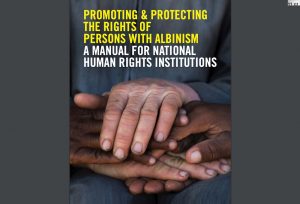. . HUMAN RIGHTS . .
An article by Rijanirina J. Randrianandrasana
A 6-year-old child, his lifeless and mutilated body, was found in the town of Berano in Amboasary on March 4, 2022. Another 4-year-old (See minutes 11-13 of the report), but with a less tragic outcome, kidnapped in Ambilobe, is located and found by the police in Tuléar with his kidnappers on July 21. What these two children have in common is that… they are people in Madagascar with albinism.

Albinism is a congenital, rare and non-contagious hereditary disease, caused by the absence of a pigment, affecting both men and women, regardless of their origin. Under international human rights law, people living with albinism are considered persons with disabilities.
However, these people are ostracized. They are often subject to direct and indirect discrimination, particularly in the areas of health, education and work. Attacks on people with albinism can vary from verbal aggression to physical aggression.. Wrong beliefs and superstitions endanger their lives and safety.
The attitude of society towards them has not changed and these people and their families are still at risk of being attacked. This is contradicted by the International Covenant on Civil and Political Rights, ratified in 1976, that stipulates that every human has the right to life and that this right is protected by law (Part III, art. 6.1) and that everyone has the right to freedom and security (art. 9.1).
(continued in right column)
How can we protect the human rights of persons with disabilities?
(continued from left column)
But the worst part is that we are all responsible for these atrocities. We, their classmates, harass them with our words and gestures. We, co-workers, devalue them given their handicap situations even if this hardly defines their aptitudes. We, their own family, are ashamed of the appearance of one of our own. We, members of society, remain silent in the face of these insults and violence. We, the decision-makers, do nothing to improve their living conditions by establishing adequate supports. We are all guilty because we do not act properly.
But, fortunately, all is not lost. We can fight against forms of violence, discrimination and stigmatization towards people with albinism. Due to their alarming situation, it is essential to make certain changes so that they can enjoy the same rights as others. The right to equality and non-discrimination does not mean that everyone must always be treated the same; sometimes distinctions have to be made. Thus, we have a duty to sensitize society on the rights of these people and to abolish discrimination and violence against them.
It is not too late for us, discriminating, ignorant people, profiteers, traffickers, to become agents of change and to organize ourselves to protect people with albinism; The fight has only just begun!!! With that, we’ll end this article with the quote from Mahatma Gandhi: “We can never know what the results of our actions will be.” But if we do nothing, we will get no results. »
Bibliography
AMNESTY INTERNATIONAL & OSISA. (2021). Promoting & Protecting the Human Rights of Persons with Albinism: A Handbook for National Human Rights Institutions. Amnesty International Ltd.
AMNESTY INTERNATIONAL. (2016, March 8). Urgent action: Malawi, danger for people with albinism.
DIDR-OFPRA. (2018, May 14). People living with albinism. Democratic Republic of Congo.
(Thank you to Jay Ralitera for sending this article to CPNN)